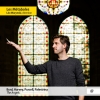The Metaboles hold the angels above the Musée d’Orsay
Resmusica - Patrick Jézéquel - The Angels
The Metaboles hold the angels above the Musée d’Orsay
For the first concert of its season, the auditorium of the Musée d'Orsay invites the Métaboles in a recital of sacred song, "The Angels", resonating with the concomitant exhibition dedicated to Louis Janmot (1814-1892) and entitled : “The Poem of the Soul.”
We knew Les Métaboles were at ease when, with all voices out (nearly 50 in total), they filled the volume of a nave (in this case that of the Vézelay basilica). Here they are in a much smaller space - that of the auditorium of the Musée d'Orsay -, with quiet and fairly dry acoustics, which perfectly suits their squad: sixteen singers. Or even much less, when, at the very beginning, four of them intone the Ave verum corpus (1605) by William Byrd, placed behind the audience, at the back of the room. The effect is striking, especially since we expected to hear their comrades on stage. The Catholic liturgy envelops us in this intimate motet, very slow and very collected. So, today, time for clarity, intensity and conviviality!
The program is based on that of the disc The Angels (NoMadMusic, 2021, Clef d'or ResMusica) augmented by three songs by Benjamin Britten (A Hymn to the Virgin, 1930), John Taverner (The Lamb, 1982) and Arvo Pärt (The Deer's Cry, 2008). Composers from the Renaissance (Byrd, Purcell, Palestrina) and others from the 20th and 21st centuries (Harvey, Britten, Pärt, Taverner), all pious and custodians of a musical culture that they transformed. Twelve songs in all, the combination of which plays on the double picture of polyphonic clarity and a certain contemporary expressiveness (for example, The Deer's Cry by Arvo Pärt, obsessive and sober – two trademarks of this creator – and which will be given again as an encore). Always with this concern to put man, that is to say the believer, at the center, therefore man alone addressing his god, hence the importance given to the text and the exclusivity to the naked voice. It is all the aesthetic interest of a choir reduced to its minimum, which ensures the intelligibility of the song in its different layers. This can be heard more particularly in Come, Holy Ghost (1984) and Plainsongs for Peace and Light (2012) by Jonathan Harvey (1939-2012), which both take up the simplicity of expression of plainsong, which we could be described as a novel. Harvey is also the most present composer this afternoon, with six pieces, surely the most astonishing too, characterized by an incredible refinement, which produces: the mystical character of his inspiration with his personal dimension, an instability maintained between worry and peace (which contrasts strongly with, in particular, the architectural solidity of the Stabat Mater [1580] by Giovanni Pierluigi da Palestrina), swirling harmonies, variations between melisma and syllabic singing, the extreme layering of registers based on chords in drone, or the clever tiling of voices as well as the surprising descending glissandi at the end of Come, Holy Ghost. All these effects are wonderfully rendered by an ensemble attentive to the flexible inflections of the conductor.
Very finely thought out, the sequence of pieces follows several concerns. First, keep the attention of listeners by alternating songs of different characters or levels of complexity. Thus the Ave Verum corpus by William Byrd and Remember not, Lord, our offenses (1681) by Henry Purcell frame A Hymn to the Virgin by Benjamin Britten and three songs by Harvey: I love the Lord (1976), Come Holy Ghost and Plainsongs for Peace and Light. Second, preserve a certain variety, in a stable context, through the regular distribution of solos. We will remember, in Byrd's Ave Verum corpus and Harvey's The Annunciation (2011), the powerful soprano Anne-Claire Baconnais, the alto Aurélie Bouglé as well as the bass Jeroen Bredewold, and, in Come, Holy Ghost, the sublime soprano Amandine Trenc and tenor Benjamin Aguirre Zubiri, whose songs literally fly out of the frame. Third, make a sort of intellectual or cultural nod by following Purcell's Remember not, Lord, our offenses and Harvey's Remember, O Lord (2003), a way of emphasizing an inspiration and a filiation.
The public was able to commune with extremely nuanced singers led by their leader, Léo Warynski, visibly grateful to his musicians and very happy to be among us.







